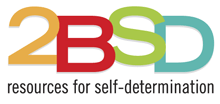Supporting self-determination for students in postsecondary education is near and dear to our hearts here at 2BSD. Like most everything else, encouraging self-determination for college students with disabilities during the pandemic has required enormous flexibility and self-determination. Patty Violi, Disability Specialist at University of Nevada, Las Vegas shared her thoughts with us about how Covid has affected her work. We are grateful to Patty for providing her perspective.
Disability Services in the Time of COVID-19
Patty Violi, M.Ed., Disability Specialist, University of Nevada, Las Vegas Disability Resource Center
As we enter our seventh month of COVID, some of us find ourselves longing for the pre-COVID days where we were able to move freely in our environments and our biggest fear is the crazydriver who cut us off on the way to work. While some of us have return to work, it looks very different and we are all adapting to our new normals in our own way. Working in higher ed. disability services has added a whole other layer of cautiousness and empathy with  my students, faculty, and staff that I work with on a daily basis.
my students, faculty, and staff that I work with on a daily basis.
In March, we moved all courses and campus services online in a matter of days. While most of the country was furloughed or waiting for their workplaces to reopen, higher ed. institutions never closed. We continued to support students and faculty in the transition to online learning and helped to ease their fears about online final exams. While not a perfect situation, I can say that our disability services office worked very hard to ensure that our students and faculty had as seamless a transition to online learning as possible. The most valuable tool I was able to provide my students was developing a new schedule to meet their needs in their new learning environments. Practicing this skill has given them the power to organize their lives and take control of their situations.
Working from home brought a new set of challenges and feline/canine appearances during various meetings throughout the day, where students could see that I was just a regular person with pets and family members that would be in and out of the camera shot. I think these added distractions humanized us and allowed the students to see us as regular people, not just the lady who sends out their accommodation letters every semester. I also felt that sharing my own experiences in transitioning to a remote environment during COVID helped my students understand that their fear and anxiety about this rapid change was normal and shared by many. Preparing for the fall semester brought a whole new set of learning opportunities as we worked with campus administrators to organize supports for students and faculty coming back to campus and those who chose to stay online. I feel that I have become a stronger advocate for my students and their accommodation needs and a better partner with faculty as they continue to develop dynamic courses in a new learning environment. As disability services professionals, we need to remember that everyone adjusts to the curveballs that COVID throws at us in our own ways. Please be patient with students, faculty, and most of all, yourselves.

3 Comments
So proud of my daughter. She wrote this article 🙂
LOVE YOU
Kiddo
Patty,
I am beyond proud of you.
You’re an amazing young Lady
I love you
Love Auntie Jane
This is such a wonderful and timely insight into the challenges and opportunities that campus professionals like Patty currently experience. The pandemic challenges students, but also those who work with them, to strengthen their self-determination. In doing so, our creativity and resourcefulness can help us employ that mantra, “We’re al in this together!” Thank you for a wonderful essay.